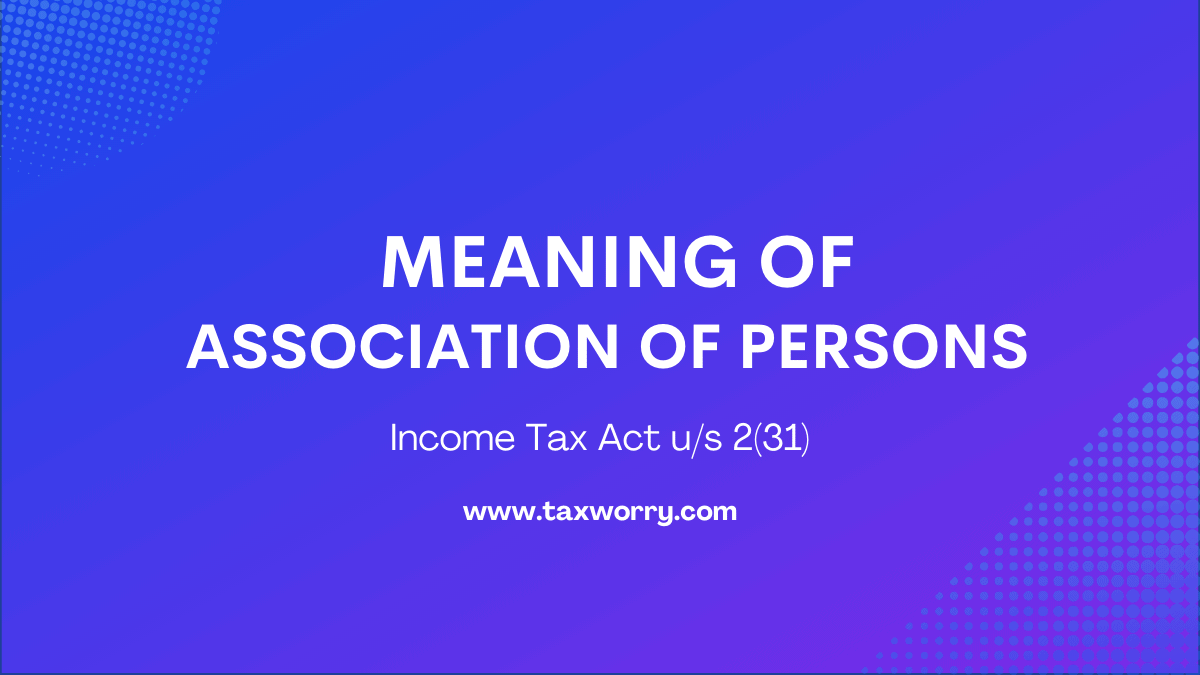Meaning of tax terms
Meaning of “Association of persons”
The meaning of association of persons under section 2(31) of the Income Tax Act is not defined in the act itself. But we can take guidance from decisions by various high courts. Here are excerpts of courts orders in which the Hon’ble High Court tried to explain the meaning of association of persons.

Meaning of association of persons defined by court
The phrase ‘association of persons’ used in section 2(31) of the Income Tax Act came up before various high courts as detailed under :
1. Hon’ble supreme court explained the meaning of ‘association of persons’ while delivering judgment in CIT vs. Indira Balkrishna [1960] 39 ITR 546 (SC) as under :
Meaning : The word ‘associate’ means, according to the oxford dictionary, ‘to join in common purpose or to join in an action’. Therefore, an association of persons must be one in which two or more persons join in a common purpose or common action, and as the word occurs in section 3 of the 1922 act, which imposes a tax on income, profits or gains, the association must be one the object of which is to produce income, profits or gains.
2. Hon’ble supreme court explained the meaning of ‘association of persons’ while delivering judgment in N.V. Shanmugham & Co. vs. CIT [1971] 81 ITR 310 (SC) as under :
Meaning : Association of persons’ as used in section 3 of the 1922 act [corresponding to section 2(31) of the 1961 act] means an association in which two or more persons join in a common purpose or common action, and as the words occur in a section which imposes a tax on income, the association must be one, the object of which is to produce income, profits or gains.
3. Hon’ble supreme court explained the meaning of ‘association of persons’ while delivering judgment in G. Murugesan & bros. vs. CIT [1973] 88 ITR 432 (SC) as under :
Meaning : For forming an ‘association of persons’, the members of the association must join together for the purpose of producing an income. An ‘association of persons’ can be formed only when two or more individuals voluntarily combine together for a certain purpose. Hence, volition on the part of the members of the association is an essential ingredient.
Even a minor can join an ‘association of persons’ if his lawful guardian gives his consent. In the case of receiving dividends from shares, where there is no question of any management, it is difficult to draw an inference that two or more shareholders function as an ‘association of persons’ from the mere fact that they jointly own one or more shares, and jointly receive the dividends declared. Those circumstances do not by themselves go to show that they acted as an ‘association of persons’.
4. Hon’ble Madras high court explained the meaning of ‘association of persons’ while delivering judgment in Estate of khan sahib mohd. Oomer sahib v. CIT [1958] 33 ITR 767 (Mad.) as under :
Meaning : To ‘associate’ is to join in a common purpose or action. ‘Association’ does necessitate the exercise of volition of those who form the association. The exercise of that volition can be by or on behalf of those who form the association.
5. Hon’ble Andhra pradesh high court explained the meaning of ‘association of persons’ while delivering judgment in Deccan wine & general stores vs. CIT [1977] 106 ITR 111 (AP) as under :
Meaning : An association of persons does not mean any and every combination of persons. It is only when they associate themselves in an income-producing activity that they become an association of persons. They must combine to engage in such an activity; the engagement must be pursuant to the combined will of the persons constituting the association; there must be a meeting of the minds, so to speak. In a nutshell, there must be a common design to produce income. If there is no common design, there is no association. Common interest is not enough. Production of income is not enough. This interpretation of the expression ‘association of persons’ flows from the meaning of the word ‘association’.
6. Hon’ble Kerala high court high court explained the meaning of ‘association of persons’ while delivering judgment in CIT v. T.V. Suresh Chandran [1980] 121 ITR 985 (Ker.) as under :
Meaning : Joining together by the members of the association for the purpose of producing income is requisite for formation of an association of persons. Such coming together or combining is a consensual act and depends upon the volition of the parties. Merely because certain persons are constituted joint owners, such as by inheriting the property of a person on his death, they do not become an association of persons, for, in that event, the jointness is the result of operation of law and not of volition of parties.
Section 2(31) of Income Tax
(31) “person” includes—
(i) an individual,
(ii) a Hindu undivided family,
(iii) a company,
(iv) a firm,
(v) an association of persons or a body of individuals, whether incorporated or not,
(vi) a local authority, and
(vii) every artificial juridical person, not falling within any of the preceding sub-clauses.
Explanation.—For the purposes of this clause, an association of persons or a body of individuals or a local authority or an artificial juridical person shall be deemed to be a person, whether or not such person or body or authority or juridical person was formed or established or incorporated with the object of deriving income, profits or gains;
In this article, you can get guidance from high courts on the meaning of association of persons under section 2(31) of the Income Tax Act.
Updated up to Finance Act 2021
